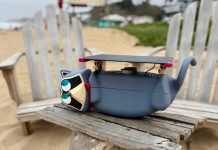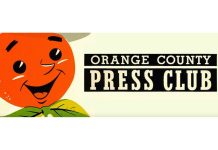A Newport Beach-based paddling team is proving you don’t need sight to realize your vision.
The OC Makapo Aquatics Project, an all blind and vision-impaired outrigger canoe paddling team based out of the Newport Aquatics Center, will participate in the 40th Annual Queen Liliuokalani Race in Kona, Hawaii, on Saturday. They are returning to where the project’s founder, John Chavez, made history six years earlier as part of the first all-blind team, along with a sighted steersman, to ever compete in the race.
This year, the now stronger and better trained team, is once again forging ahead to meet the challenges of the popular 18-mile race, known as the largest long distance outrigger canoe race in the world. There will be nearly 150 other teams on the water this weekend.
“For the first couple of years, we just paddled,” Chavez said. “We didn’t know much about technique or training. We just paddled.”
The team has significantly improved over the years. Their technique has gotten better, they’ve become stronger athletes, they are more precise and their times have gotten much faster. While just being able to finish the Lili’uokalani race a few years ago was a huge accomplishment, they’ve now become a worthy competitor and they’ll keep better in the years to come.
But paddling means so much more than just winning to this team.
“It’s so not about the winning,” said coach Kirsten Williams. It’s about so much more than that, she said.

It all started after Chavez paddled in the Kona race with a sighted team in 2005. He decided this was something he wanted to do again, only next time with an all blind paddling team.
The next year, Chavez got four other blind men together and, as the Blind Siders, finished the race as the first ever all blind paddling team along with a sighted steersman. The team included Chavez, John Holton, RJ De Rama, Ron Johnson, and Tad.
They may not have been able to see them, but they could certainly hear the roaring cheer of the crowd as they crossed the finish line.
After paddling with the Blind Siders Chavez decided to put together a competitive blind racing team. He went to Bill Whitford, executive director of the NAC, for help. Whitford told him he was insane, Chavez said with a laugh, but Whitford rose to the challenge. Together they collaborated and organized and the OC Makapo Aquatics Project was born.
“So, that’s how it all started,” Chavez said.
Whitford helped them find a steersman and a boat. They practiced once a week and as a complete team had maybe a dozen practices before the big Hawaiian race.

Whitford has helped the program become a success, Chavez, Williams and many of the paddlers agreed.
“They [Whitford and the NAC] have been very generous with their time and facilities,” Holton said.
And because of their generosity the program has grown a lot over the past few years, Chavez said.
The Makapo team has gone from practicing once a week, only a handful of times before the big race, to meeting four times a week since June, and three times a week before that, starting in March.
Some people think that it’s too hard, Holton said, but it’s really not. It gets easier with practice, he said.
During the water break of his first practice, paddler Tony Davis jokingly asked for oxygen instead. Now he’s getting ready to paddle 18 miles with the Makapo team.
“I have no idea what it’s going to be like,” said Tony Davis, who hasn’t done the Hawaii race before. “All I know is it’s three hours of paddling.”
But it’s all worth it, all the paddlers agreed.

The first day Patti Carpenter joined the team they paddled the one mile from Newport Aquatic Center to the PCH bridge. That course, which now takes them about 10 minutes, took them 45 minutes to complete. When they finally reached the bridge they all whooped and cheered.
“When we went under the bridge, and heard that echo… Oh… Oh…That was it,” Carpenter said. She was hooked.
“It’s been a wonderful, positive experience,” Carpenter said. “[I gain] a sense of self-satisfaction and accomplishment.”
Davis was hooked the first day too, he said.
“We don’t know [why we love it so much], we just keep coming back,” Davis joked.
“It really makes you feel free,” Carpenter said.
It’s a great social and athletic environment, Davis added, as well as being able to be part of a team.
“For a blind person, there are no organized, team sports that we can be involved in,” Davis said. “This is a team sport, we rely on each other tremendously. And we can do this.”

The team competes in races between Newport Beach and San Diego, Carpenter said, that are anywhere between 4 to 20 miles in length. They usually race as a six-person team, even doing half wet/half dry changes while the canoe is in motion.
Lili’uokalani is an iron man race, the six people in the canoe will do the entire race, no changes. The week after that, Makapo heads to Catalina for a nine person race, six in the canoe and three on the chase boat as relief paddlers.
The Catalina race is the Southern California Outrigger Racing Association’s U.S. Championship Catalina Channel Crossing. The women will race over to Catalina on Sept. 10 and the men’s team race back on Sept. 11. For anyone wanting to cheer them on, the finish line will be at Newport Dunes.
The almost 26-mile race will take the team about five and a half hours, Williams said.
Anybody interested is welcome, it doesn’t matter what level of paddling experience they have.
The Makapo team suggest any blind person interested in paddling to come out and give it a try during one of their “Get On Board” days.
“There are so few opportunities for blind people to be a part of a team,” Carpenter said, “that this has been amazing, absolutely amazing.”

Most have met through the Braille Institute of Orange County in Anaheim or through friends and other connections in the blind community.
It’s also been a very positive addition to the paddling community.
“The paddling world has totally embraced us,” Carpenter said.
They get an incredible amount of encouragement and support from other teams, the team members all agreed, even in a race.
For the Queen Lili’uokalani Race, the team will be using a hand-made Koa wood canoe, loaned out to them by the Pukea Foundation. This is a huge honor, Williams said.
Though this is their third time in the Kona race and numerous other local races, and they’ve improved dramatically over the years, their technique is not flawless and they still have their own challenges.
“The timing in our canoe [paddling], we have to learn it by feel…by sounds,” Davis said. “We have to concentrate harder.”
“We’d like to apologize to the people of Kona in advance for all the times we’re going to bump in other boats,” Holton joked.
But being perfect isn’t even the tip of the iceberg of what this means to them.
“When they go through their daily life, there is always some level of stress,” Williams recounted how a few paddlers have described it to her. “And when they get in the canoe, there’s none of that.”
Others shouldn’t underestimate blind people, Holton said, and blind people shouldn’t underestimate themselves.
“Society is going to limit you [as a blind person], but don’t limit yourself,” Chavez added. “You know what you can do and what you can’t do, but if there’s something out there that’s feasible [that you want to try], then do it.”
Makapo is a 501c(3) and anyone interested in helping them get to Hawaii or just supporting the team in general is encouraged to make a donation, buy Makapo gear and/or come out and cheer them on at a race. Visit www.ocmap.org for more information.





